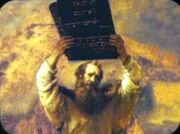No edit summary |
mNo edit summary |
||
| Line 1: | Line 1: | ||
| − | [[Image:Moses.jpg|thumb| |
+ | [[Image:Moses.jpg|thumb|''[[Moses Showing the Tables of the Law]]'']] |
The '''Ten Commandments''' (or '''Tables of the Law''') were a list of [[religion|religious]] [[law]]s, spoken by [[God]] and written by [[Moses]]. |
The '''Ten Commandments''' (or '''Tables of the Law''') were a list of [[religion|religious]] [[law]]s, spoken by [[God]] and written by [[Moses]]. |
||
| − | + | The [[painting]] entitled ''[[Moses Showing the Tables of Law]]'', depicting an image of Moses showing his people the Tables of the Law, was contained in the [[USS Enterprise (NCC-1701) library computer|library computer]] aboard the {{USS|Enterprise|NCC-1701}}. This data was flashed on a [[viewscreen]] when the [[Talosian]]s scanned the ''Enterprise'' [[computer]] in 2254. ({{TOS|The Cage}} ''remastered'') |
|
[[Samuel Cogley]] indirectly referred to this text to [[James T. Kirk]] while discussing the importance of [[book]]s in learning law in its rawest form. To Cogley, books explored the ancient concepts of law in their own language, from which one could learn the intent of the men who wrote them, from Moses to the [[Tribunal of Alpha III]]. ({{TOS|Court Martial}}) |
[[Samuel Cogley]] indirectly referred to this text to [[James T. Kirk]] while discussing the importance of [[book]]s in learning law in its rawest form. To Cogley, books explored the ancient concepts of law in their own language, from which one could learn the intent of the men who wrote them, from Moses to the [[Tribunal of Alpha III]]. ({{TOS|Court Martial}}) |
||
| − | [[Seamus]], a [[hologram|holographic character]] from [[Fair Haven]], had a habit of breaking the Fifth Commandment |
+ | [[Seamus]], a [[hologram|holographic character]] from [[Fair Haven]], had a habit of breaking the Fifth Commandment – "Honor your father and mother." He confronted [[Father]] [[Mulligan]] ([[the Doctor]]) for "a bit of counsel," after having broke Fifth Commandment again. Mulligan's resolve for this was for Seamus to say ten ''[[Our Father]]s'' and to call him in the morning. ({{VOY|Fair Haven}}) |
==Background== |
==Background== |
||
Revision as of 00:10, 28 December 2008

The Ten Commandments (or Tables of the Law) were a list of religious laws, spoken by God and written by Moses.
The painting entitled Moses Showing the Tables of Law, depicting an image of Moses showing his people the Tables of the Law, was contained in the library computer aboard the USS Enterprise. This data was flashed on a viewscreen when the Talosians scanned the Enterprise computer in 2254. (TOS: "The Cage" remastered)
Samuel Cogley indirectly referred to this text to James T. Kirk while discussing the importance of books in learning law in its rawest form. To Cogley, books explored the ancient concepts of law in their own language, from which one could learn the intent of the men who wrote them, from Moses to the Tribunal of Alpha III. (TOS: "Court Martial")
Seamus, a holographic character from Fair Haven, had a habit of breaking the Fifth Commandment – "Honor your father and mother." He confronted Father Mulligan (the Doctor) for "a bit of counsel," after having broke Fifth Commandment again. Mulligan's resolve for this was for Seamus to say ten Our Fathers and to call him in the morning. (VOY: "Fair Haven")
Background
According to Michael Okuda, the inclusion of the Rembrandt image "Moses Smashing the Tables of the Law" among the remastered library computer images seen in "The Cage" because it was "intended to tie into the theme of humans hating captivity, which is also why I dwelt more on Lincoln than the other American presidents."
